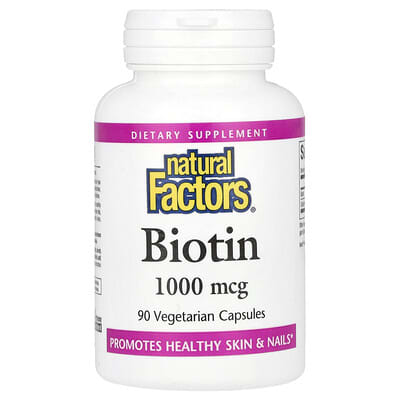
Biotin 1000 mcg
Natural Factors
Biotin 1000 mcg
4.8
★ ★ ★ ★ ★
(573 ratings)
Biotin 1000 mcg

Score 60.0
An economical, low-dose biotin supplement for general daily support.
Quantity: 90 Capsule(s)Servings size: 1 Capsule(s) (90 servings)
Selected goals:
Other goals:
Hair Health
Skin Health
Nail Health
leaderboard Score 60.0
An economical, low-dose biotin supplement for general daily support.
insights Analysis
Natural Factors Biotin 1000 mcg provides a lower, more moderate dose of biotin compared to many popular 'beauty' supplements, which often feature 5000 mcg or 10000 mcg. This dosage is ideal for general daily supplementation to prevent deficiency or for individuals who prefer a lower intake. The product's main advantage is its very low price per serving, making it an extremely budget-friendly option. While it's a solid choice for foundational biotin support, its lower potency might not meet the expectations of consumers seeking dramatic improvements in hair, skin, and nail appearance as promised by higher-dose alternatives.
- Very economical with an exceptionally low price per serving.
- Provides a moderate 1000 mcg dose, suitable for general health and daily maintenance.
- Good for those sensitive to higher doses or looking for basic biotin support.
- Lower biotin concentration (1000 mcg) compared to popular 'high potency' beauty supplements, potentially limiting perceived effects for specific goals.
- Specific form of biotin (e.g., D-Biotin) is not specified.
- While lower risk than high doses, any biotin supplementation should be disclosed to healthcare providers, as it can still interfere with certain lab tests.
$7.67($0.08 per serving)
 Amazon Amazon | $ 0.00 | |
| $ 7.67 | ||
 Vitacost Vitacost | $ 7.67 |
bolt Effectiveness for goals
Some research suggests that biotin supplementation may improve hair strength and reduce shedding, particularly in individuals with an underlying biotin deficiency. However, robust evidence for significant hair growth benefits in healthy individuals without a deficiency is limited. It primarily supports the body's natural keratin infrastructure.
Biotin, also known as vitamin B7, is frequently taken to support hair, skin, and nail health. It is also involved in various metabolic processes, helping convert food into energy. The effectiveness for these specific uses in individuals without a deficiency is an active area of research.
Scientific evidence supports biotin's essential role as a coenzyme in various metabolic pathways and its therapeutic use in treating biotin deficiency. For claims regarding improved hair, skin, and nails in healthy individuals, the scientific literature provides mixed results, often relying on smaller studies or anecdotal evidence rather than large-scale, controlled trials.
Several clinical studies have indicated that biotin supplementation can improve nail thickness and reduce splitting in individuals experiencing brittle nail syndrome. This benefit is thought to stem from biotin's role in the production of keratin, a primary component of nails. Results typically require consistent use over several months.
Biotin is an essential nutrient, and severe deficiency can manifest as hair loss, skin rashes, and neurological symptoms. Supplementation is most clearly effective in alleviating these symptoms when an actual deficiency is present. For individuals with adequate biotin levels, the benefits of additional supplementation are less consistently established by research.
schedule Dosage, timing & forms
While there is no official Recommended Dietary Allowance (RDA) for biotin due to its rarity of deficiency, an Adequate Intake (AI) of 30 micrograms (mcg) per day is established for adults. However, many supplements contain significantly higher doses, often ranging from 1,000 mcg to 10,000 mcg, particularly for those looking to support hair, skin, and nail health. Always consult product labels and a healthcare professional for personalized guidance.
Biotin is a water-soluble vitamin, meaning excess amounts are generally excreted by the body. While widely considered safe even at doses much higher than the AI (e.g., 5,000-10,000 mcg), extremely high doses have been shown to interfere with certain laboratory tests, particularly those for thyroid function and cardiac biomarkers, potentially leading to inaccurate results. It is advisable to inform your healthcare provider about any biotin supplementation, especially before lab tests.
The time required to observe noticeable results from biotin supplementation can vary significantly among individuals. For improvements in hair, skin, or nails, consistent daily use over several weeks to a few months is commonly suggested before any changes may become apparent. Individual factors like metabolism and initial biotin status can influence the timeline.
Biotin supplements can generally be taken at any time of day, with or without food, as preferred. Some individuals choose to take it in the morning with breakfast to help establish a consistent routine. Consistency in daily intake is often considered more important than the specific time of day for efficacy.
Biotin supplements are available in a wide range of strengths, often much higher than the established Adequate Intake. Common supplement strengths include 1,000 mcg (1 mg), 5,000 mcg (5 mg), and 10,000 mcg (10 mg). Some products may offer even higher dosages depending on their intended use.
health_and_safety Safety & interactions
Yes, high doses of biotin supplements can significantly interfere with certain laboratory tests, especially those using biotin-streptavidin technology. This interference can lead to falsely high or low results for hormones, cardiac markers, and other analytes. It is crucial to inform your doctor about biotin use before any lab work to avoid misdiagnosis or inappropriate treatment.
Biotin is generally well-tolerated, and side effects are rare when taken at recommended doses. Some individuals might experience mild digestive upset, nausea, or skin rashes, though these are uncommon. Due to its water-soluble nature, excess biotin is typically excreted from the body.
Biotin can potentially interact with certain medications, such as some anti-seizure drugs, which may lower biotin levels in the body. Conversely, high biotin intake might affect the metabolism of other drugs. Always consult a healthcare professional before combining biotin with any prescription medications.
While biotin is water-soluble and excess is typically excreted, very high doses can lead to potential issues like interference with lab tests. There is no established upper tolerable intake level due to low toxicity, but exceeding recommended daily amounts without medical supervision is not advised. Always discuss appropriate dosage with a healthcare provider.
Biotin is an essential nutrient during pregnancy, and adequate intake is important for fetal development. However, supplementing with high doses beyond what is found in a standard prenatal vitamin should be discussed with a healthcare provider. Current research suggests it is likely safe at recommended daily allowances for breastfeeding mothers.
Ingredients
| Ingredient | Amount per serving |
|---|---|
Biotin | 1000 mcg |
Calcium | 25 mg |
Categories
Biotin 60.0
As a biotin supplement, its main advantage is affordability for general wellness. However, it falls short in potency compared to the typical 'high-potency' biotin products marketed for specific hair, skin, and nail improvements, making it a good basic option but not a standout for these specific beauty-focused goals.
Goals
Nail Health 68.0
Some studies suggest that even lower doses of biotin can improve brittle nails over time. This 1000 mcg dose offers a gentle approach to nail strengthening, though results may be slower or less pronounced compared to the rapid improvements often reported with 5000 mcg or 10000 mcg doses.
Hair Health 65.0
While 1000 mcg of biotin is sufficient to prevent deficiency and support basic hair health, it may not deliver the dramatic improvements in growth or thickness that many consumers seek for this goal, which are often associated with higher doses.
Skin Health 60.0
This dose provides foundational support for skin cell metabolism. However, for noticeable improvements in skin clarity or elasticity, particularly for those without a deficiency, higher doses or multi-ingredient supplements are often preferred by consumers and recommended by nutritionists.
Recommended Alternatives
90 Value 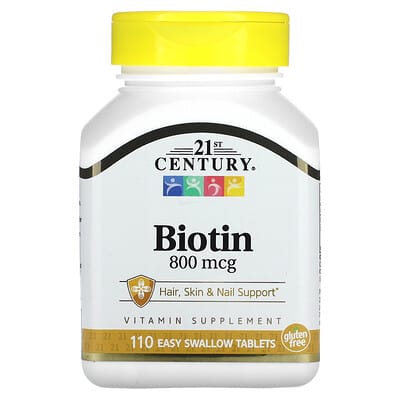
Biotin 800 mcg
21st Century
4.7
★★★★★
(20132 ratings)
Offers very good value for a daily biotin supplement at a modest dose, extremely popular with many users due to its low price and effectiveness.
82 Value 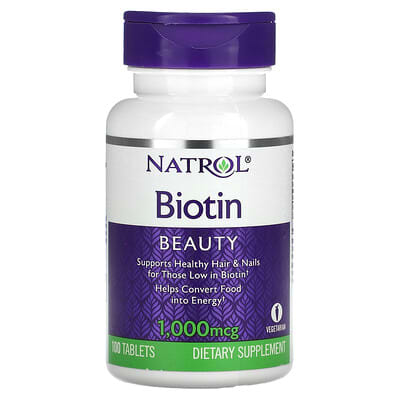
Biotin 1000 mcg
Natrol
4.6
★★★★★
(6978 ratings)
Provides 1000 mcg biotin from a well-regarded brand at a very competitive price per serving, offering excellent value for this potency.
80 Value 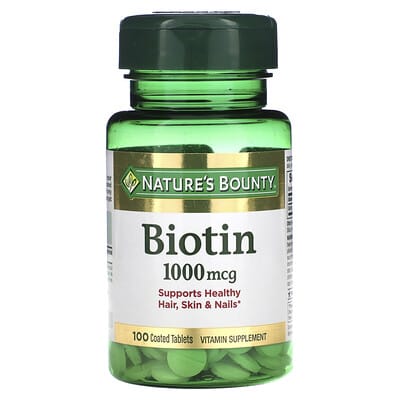
Biotin 1000 mcg
Nature's Bounty
4.6
★★★★★
(5254 ratings)
Offers 1000 mcg D-Biotin from a leading brand at a solid price, representing strong value for a moderate dose of this essential vitamin.
85 Performance 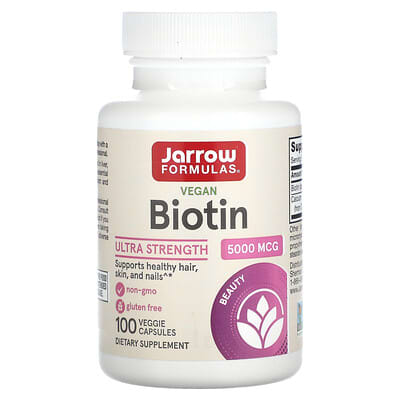
Biotin
Jarrow Formulas
4.6
★★★★★
(3133 ratings)
Offers 5000 mcg D-Biotin, a significantly higher and more potent dose for comprehensive hair/skin/nail support, from a well-regarded brand.
95 Performance 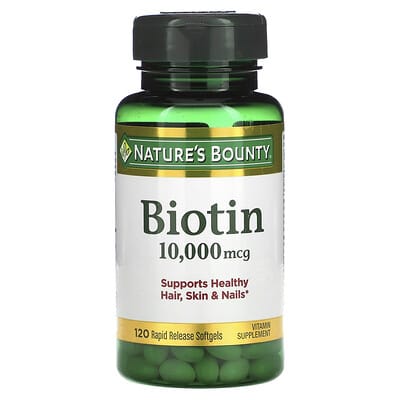
Biotin 10000 mcg
Nature's Bounty
4.6
★★★★★
(117098 ratings)
For those seeking much higher potency, this 10000 mcg D-Biotin option from a leading brand is a substantial upgrade, providing maximum impact.
82 Performance 
Biotin 1000 mcg
Natrol
4.6
★★★★★
(6978 ratings)
Provides the same 1000 mcg biotin from a highly reviewed brand, known for its quality and often featuring fast-dissolve options, making it a reliable alternative.
90 Budget 
Biotin 800 mcg
21st Century
4.7
★★★★★
(20132 ratings)
Offers a slightly lower dose but at a significantly cheaper price per serving, with a massive number of positive reviews, providing excellent value for daily use.
88 Budget 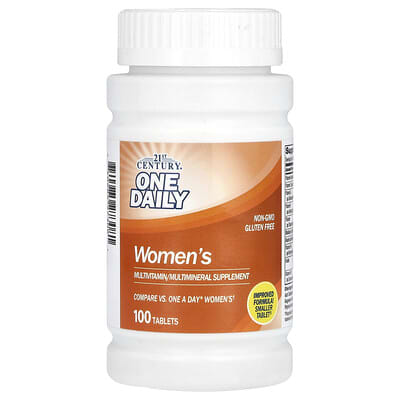
One Daily Women's
21st Century
4.7
★★★★★
(31249 ratings)
While a multi-vitamin, it includes 1000 mcg D-Biotin at an exceptionally low price per serving, making it a very cost-effective way to get biotin with other nutrients.
85 Budget 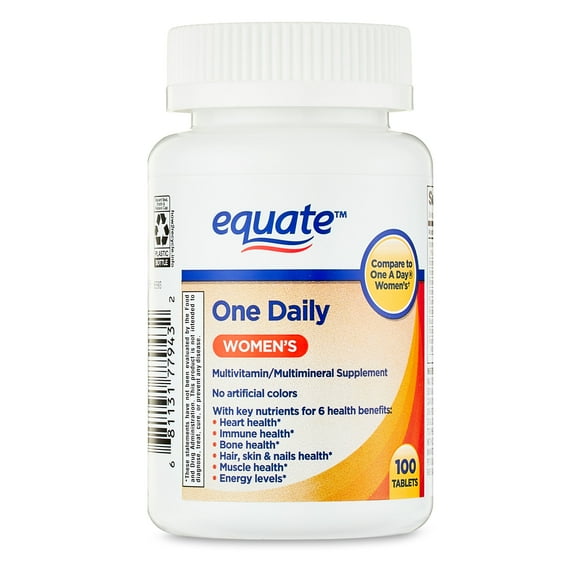
One Daily Women's Health
Equate
4.6
★★★★★
(4320 ratings)
Another multi-vitamin option with biotin at a very low price per serving, offering broad nutrient support for overall health and specific beauty benefits.
90 Value 
Biotin 800 mcg
21st Century
4.7
★★★★★
(20132 ratings)
Offers very good value for a daily biotin supplement at a modest dose, extremely popular with many users due to its low price and effectiveness.
82 Value 
Biotin 1000 mcg
Natrol
4.6
★★★★★
(6978 ratings)
Provides 1000 mcg biotin from a well-regarded brand at a very competitive price per serving, offering excellent value for this potency.
80 Value 
Biotin 1000 mcg
Nature's Bounty
4.6
★★★★★
(5254 ratings)
Offers 1000 mcg D-Biotin from a leading brand at a solid price, representing strong value for a moderate dose of this essential vitamin.
85 Performance 
Biotin
Jarrow Formulas
4.6
★★★★★
(3133 ratings)
Offers 5000 mcg D-Biotin, a significantly higher and more potent dose for comprehensive hair/skin/nail support, from a well-regarded brand.
95 Performance 
Biotin 10000 mcg
Nature's Bounty
4.6
★★★★★
(117098 ratings)
For those seeking much higher potency, this 10000 mcg D-Biotin option from a leading brand is a substantial upgrade, providing maximum impact.
82 Performance 
Biotin 1000 mcg
Natrol
4.6
★★★★★
(6978 ratings)
Provides the same 1000 mcg biotin from a highly reviewed brand, known for its quality and often featuring fast-dissolve options, making it a reliable alternative.